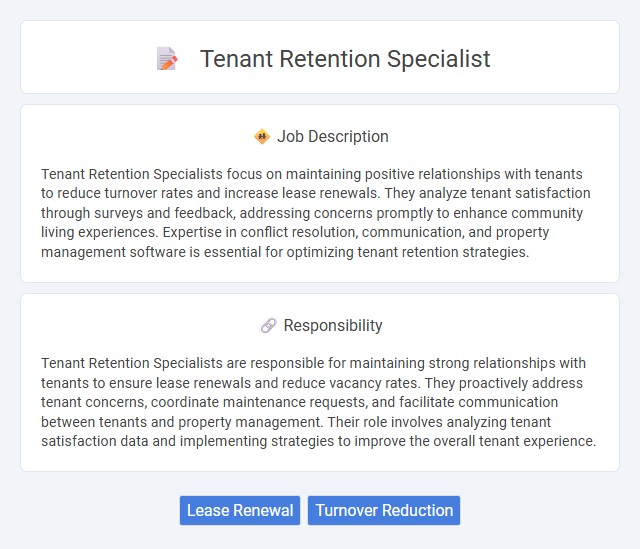
Tenant Retention Specialists focus on maintaining positive relationships with tenants to reduce turnover rates and increase lease renewals. They analyze tenant satisfaction through surveys and feedback, addressing concerns promptly to enhance community living experiences. Expertise in conflict resolution, communication, and property management software is essential for optimizing tenant retention strategies.
Individuals with strong interpersonal skills and a proactive mindset are likely to thrive as Tenant Retention Specialists, as the role demands effective communication and conflict resolution abilities. People who enjoy building relationships and possess patience are probably well-suited for this job, given its emphasis on understanding tenant needs and fostering long-term satisfaction. Those who prefer routine tasks with minimal social interaction may find this position less suitable due to its dynamic and client-focused nature.
Qualification
A Tenant Retention Specialist must possess strong communication and interpersonal skills to effectively handle resident concerns and foster positive relationships. Proficiency in property management software, conflict resolution, and knowledge of leasing regulations are essential qualifications. Experience in customer service and a track record of improving tenant satisfaction and retention rates significantly enhance job performance.
Responsibility
Tenant Retention Specialists are responsible for maintaining strong relationships with tenants to ensure lease renewals and reduce vacancy rates. They proactively address tenant concerns, coordinate maintenance requests, and facilitate communication between tenants and property management. Their role involves analyzing tenant satisfaction data and implementing strategies to improve the overall tenant experience.
Benefit
A Tenant Retention Specialist likely improves tenant satisfaction and reduces vacancy rates by addressing tenant concerns promptly and effectively. This role may increase property revenue stability through consistent lease renewals and lower turnover costs. Companies employing these specialists probably experience enhanced community reputation and stronger tenant relationships, fostering long-term occupancy.
Challenge
Tenant Retention Specialists likely face the challenge of balancing diverse tenant needs while addressing maintenance and lease concerns promptly. High turnover probability may increase when communication gaps or dissatisfaction arise, requiring proactive engagement strategies. Navigating conflicts and ensuring tenant satisfaction might demand adaptive problem-solving skills to foster long-term occupancy.
Career Advancement
Tenant Retention Specialists play a crucial role in property management by maintaining occupant satisfaction and reducing turnover rates, directly impacting company profitability. Career advancement opportunities include progression to Property Manager, Regional Manager, or Director of Tenant Services, where strategic oversight and leadership skills become essential. Developing expertise in customer relationship management, conflict resolution, and data analysis enhances prospects for promotion and higher compensation.
Key Terms
Lease Renewal
A Tenant Retention Specialist focuses on maximizing lease renewal rates by developing personalized communication strategies and addressing tenant concerns promptly. They analyze lease expiration data to proactively engage tenants with tailored renewal offers and incentives, enhancing overall tenant satisfaction. Effective management of lease renewal processes reduces vacancy rates and supports sustained property revenue growth.
Turnover Reduction
Tenant Retention Specialists play a critical role in turnover reduction by implementing targeted communication strategies and resolving tenant concerns promptly to enhance satisfaction. Leveraging data analytics helps identify at-risk tenants early, enabling proactive engagement and personalized service that minimizes lease cancellations. Effective retention programs directly decrease vacancy rates and operational costs, boosting overall property profitability.
 kuljobs.com
kuljobs.com